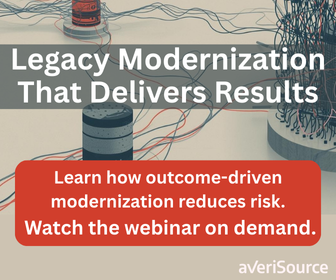Utah’s Office of Recovery Services Moves from COBOL to Cloud in 18 Months
Utah’s Office of Recovery Services (ORS) is responsible for both collecting child support payments across the state and ensuring public funds are used appropriately. For 24 years it has relied on a COBOL-based mainframe application to run its case management and accounting system (ORSIS), but over the years, the system became increasingly costly to maintain.
According to Bart Mason, technology lead for the ORS, it became clear that the system was due for an overhaul. “It had an outdated user interface that was challenging for our agents to use. And we had a hard time finding COBOL developers to support it.”
Rewriting the application from scratch was considered and then quickly nixed as a realistic option. Between the $200 million project price tag and the additional five to 10 years it would take to be certified by federal agencies, the pathway seemed clear:
“Those kinds of budgets and timelines don’t exist for us,” says Mason. “There was absolutely no way we could do this, so we went with cloud migration.”
The agency used a fully automated refactoring tool to migrate the code and data, and ORS transformed its COBOL-based application to a Java-based system running on a public cloud, which allowed the migration to take place incrementally.
Mason says, “The advantage of doing a one-for-one migration is that we were able to easily retrain our COBOL developers to work on the new system. They knew the old system very well, and we didn’t want to lose them. Now they’re able to work in Java and Python, and we’ve moved from a waterfall development process to Agile.”
Without the need to wait for federal certification, the entire migration took place within 18 months. So far, the agency is finding that the new cloud-based system is easier for both internal and external stakeholders to use, as well as simplifying the process of complying with federal mandates, state and local legislation, and security requirements.
“We have to constantly make changes to meet these requirements,” explains Mason. “That’s easier and faster to do with the cloud-based application.”
Souce: Deloitte
IBM CEO Says He Won’t “Get Rid Of” a Single Programmer Because of AI
Ever since his announcement in August that IBM would replace nearly 8000 jobs with AI, IBM CEO Arvind Krishna has found himself on the defensive, insisting that technology will create more jobs than it will make redundant. His comments have fed the anxiety about AI replacing workers and leading to decreased salaries.
At Fortune’s CEO Initiative conference last week, Krishna made an attempt to further clarify how IBM will be using AI, namely with the primary goal of eliminating “repetitive, white-collar jobs” primarily in HR.
Programmers, on the other hand, should not find their livelihoods threatened, according to Krishna, though they will likely become more productive because of AI:
“I don’t intend to get rid of a single one. I’ll get more,” he said. He added that IBM is actually increasing the number of software engineering and sales roles over the next three to four years, while HR roles are being phased out.
Krishna joins other tech leaders who have argued that AI will augment existing jobs without becoming a job destroyer.
Source: Business Insider
NPR Podcast “The Indicator” Profiles Revolutionary IBM CEO Thomas Watson Jr.
According to IBM, Thomas J. Watson was “a pioneer in the development of accounting and computing equipment used today by business, government, science and industry.” This week, though, NPR’s “The Indicator” podcast features Marc Wortman, whose recently published book uses more colorful language to describe Watson: “The Greatest Capitalist Who Ever Lived: Tom Watson, Jr., and the Epic Story of How IBM Created the Digital Age.”
Watson’s vision to make “one, universal computer that could be modified to serve all kinds of needs” seems quotidian today, but it’s hard to overstate the risk Watson took when he charted IBM’s course away from their successful model of customized, bespoke computers for various industries.
The podcast focuses on the massive gamble Watson took in 1964 to introduce the System/360, which had the potential to undermine IBM’s entire business model. It’s a great, short listen for anyone interested in the history of computing and the early days of the mainframe.
Source: NPR





0 Comments